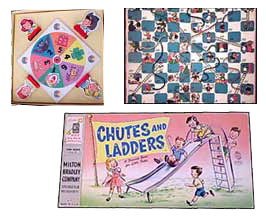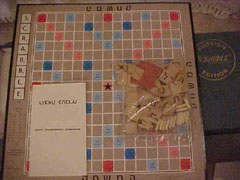
Board Game Theology:
Two Common Board
Games That
Illustrate Complex
Theological Positions
by Dan Kotler

Chutes and Ladders: Divine Grace and Mercy, and Predestination
Good and Evil are very real concepts, with very real consequences.
We mortal sinners are desperately trying to navigate the treacherous
path to salvation (i.e., the end of the board) while bypassing the
temptations that lead to our downfall. God is merciful: even after the
furthest slide down the chute of temptation, it always possible to begin
again on the quest for salvation.
Unfortunately, we mortals have absolutely no control over whether or not will
fall into temptation. Whether or not we can avoid sin depends entirely upon
Divine Grace (i.e., the spinner). We humans have no actual control over our
lives or our ultimate fate.

Scrabble: Kabbalah (Jewish Mysticism)
Kabbalah places a great deal of emphasis on the letters of the alphabet.
Each letter has a numerical value, so various combinations of letters have
various mystical and numerological significances.
Kabbalah also contains the concept of the Sephirot, the ten emanations or
aspects of God. These Sephirot emanate from the Ein Sof , the undifferentiated,
primordial, and divine nothingness which is nothing and everything at the same time.
The Ein Sof is the blank tile on the Scrabble board of creation: nothing, and yet
everything at the same time.
(Of course, for the Scrabble allegory to really work, the Scrabble game ought
to be in Hebrew. But we can compromise.)
go back
|